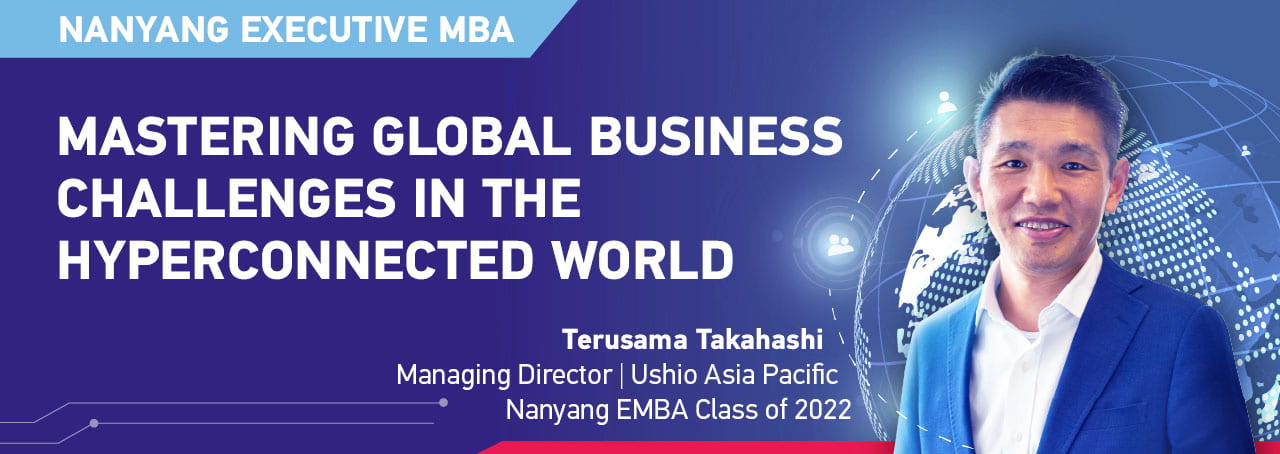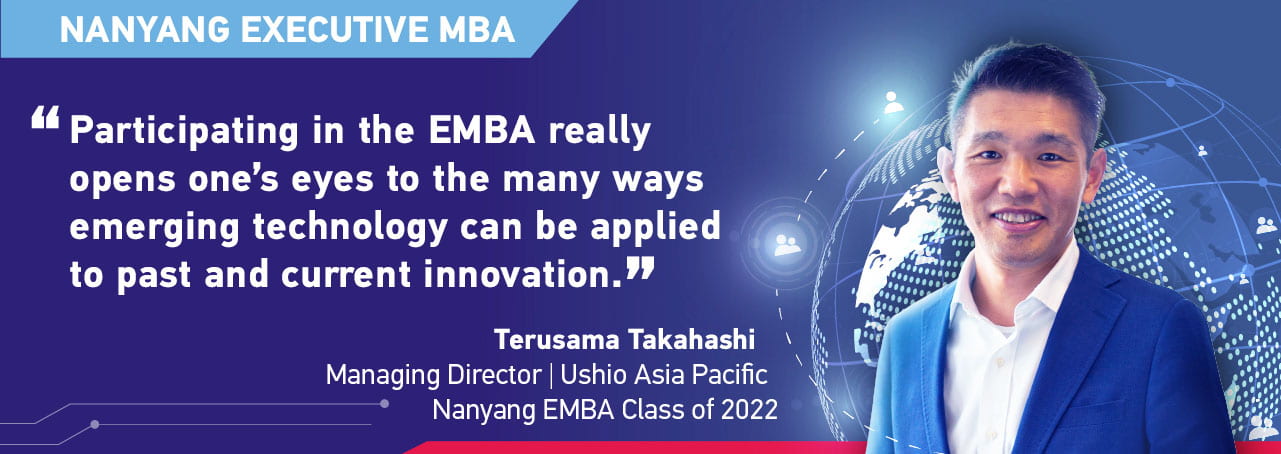Graduate Studies Blog

NANYANG EXECUTIVE MBA
Mastering Global Business Challenges in a Hyperconnected World
6 minute read.
Even as USHIO continues to sell conventional light source products today, the company’s “old” product lines now share space with “new” ones that are designed with sustainability in mind and enhance the common good. USHIO’s LED lighting innovations for indoor farming systems, for example, drive greater food security for countries in the region.
“I would like to understand the values of Southeast Asia, achieve a regional and global business, and create an environment where we can co-create well,” says Takahashi. However, having only ever worked at a single company meant he had limited perspectives on other companies’ operations, management, and leadership styles. To gain a more complete picture of how to run a successful business, Takahashi decided to pursue an Executive MBA (EMBA) with Nanyang Business School (NBS), located in Nanyang Technological University, Singapore (NTU Singapore).
Facing constant changes and finding new solutions
Takahashi sees two major challenges facing modern businesses today, which require more training and knowledge to address. First, he realised that “decentralising” is not just a business model buzzword but an imperative. The world’s borders are quickly being effaced, says Takahashi. “Our industry is strong and robust, but our main market is no longer just Japan, and we are lagging behind when it comes to engaging new markets in the region.” He believes that introducing USHIO to the Asian region involves working with more foreigners and moving critical functions like marketing, product development, and quality control out of Japan.
The Cultural Intelligence module of the Nanyang EMBA was critical in helping him understand different communication styles. For participants seeking to lead global businesses, this module is always placed in the first segment of the EMBA programme to establish a strong foundation. He also learned about the different ways Chinese and American companies approach innovation, and how USHIO can apply them to become a more forward-thinking global company.
Second, it is imperative for companies to engage in sustainability efforts for the longevity of the business. There is increasing pressure from consumers and regulatory bodies for businesses to focus on creating long-term value for their clients and stakeholders. The United Nations set 17 Sustainable Development Goals in 2016 in areas of growth targeting poverty, clean water and sanitation, gender equality, affordable and clean energy, sustainable cities and communities, and climate action, to name a few. Enterprises are increasingly playing a major role in achieving these goals.
As Professor William Chen, Director, Food Science & Technology Programme (FST), NTU says: “Sustainability issues such as food security are increasingly impacting organisations’ reputations and bottom lines.”
There are many ways for the organisation to become more sustainable. A firm can start off by making a statement, as NTU Singapore has with our 15-year sustainability manifesto. From there, it’s possible to make ESG commitments, invest in green energy, and explore scientific innovation in our respective industries, as USHIO has done.
Building a sustainable business for long-term success
USHIO started as an industrial equipment manufacturer but the company is now known as a producer of agricultural lights and electrolysed crop watering systems. These products are commonly used in industrial agricultural plants around Asia, especially where agricultural land is unavailable and where food security is a concern. According to Professor Chen, Singapore’s most pressing food innovation concerns are primary production such as urban farming, food processing technology, and nutrition for its aging population.
Unlike individuals who can grow spinach from seeds using a basic hydroponic system and harvest edible leaves in a couple of weeks, the work of professional farmers – who are responsible for growing fresh produce for entire nations – is far more complicated. They must combat plant diseases, encourage the most efficient growth possible, and reduce their reliance on chemical pesticides, preservatives, and disinfectants.
Their job is made tougher by the inconsistent weather patterns, caused by climate change as well as local agricultural conditions, which aren’t always conducive. In Singapore, limited arable land and exceptionally hot temperatures make the population highly dependent on imported fresh produce.
Food science innovation, or the study of maximising high-value food production through technology, is necessary to ensure everyone has enough safe food to eat. The field is driven by industry-academia collaborations, like what NTU is currently undertaking with small and medium-sized enterprises (SMEs) and multinational companies (MNCs) around the region. These partnerships help maximise the utilisation of imported food, combat local climate challenges, and potentially improve local food production.

The Nanyang EMBA provides clear examples of how blockchain and artificial intelligence (AI) can converge to support a more sustainable and equitable future. This includes applying AI and data analytics to help farmers optimise their produce or redesign indoor farming facilities to maximise ‘arable’ space.
“Interest is high for relevant modules that explore AI and blockchain. However, after joining the programme, I realised that the modules on economics and sustainability are equally as insightful. They give us a global perspective and help us understand important issues that leaders must be aware of,” Takahashi added.
Relying on technology to solve today’s pressing problems
There is a real need to help innovators pass on their knowledge to others and to help individuals like Takahashi become leaders within their organisations. Takahashi explains: “The world is changing rapidly, and I think it is important that we understand how our industry has and will continue to change. As a science and engineering university, I believe NTU has a unique advantage that can make us more impactful in our areas of expertise.”
In addition to indoor farming, USHIO has invested heavily in medical products such as the Care222 sterilisation system, where light emitted at a wavelength of 222 nanometers is used to sterilise entire facilities, destroying harmful pathogens including the COVID-19 virus. “Through governmental support, we are sharing these technologies not just with developed countries of the world but also with other areas that don’t receive as much support,” he added.
When asked what he found most meaningful about the Nanyang EMBA programme, Takahashi highlighted the diverse environment and constant support from NBS staff and fellow classmates. “I am very pleased with the programme. With the many different perspectives from lecturers, guest speakers, and my own classmates, I believe I now make better business decisions than before, decisions that I hope create a positive impact on both our employees and customers.”
The Nanyang Executive MBA is a part-time 13-month programme designed for senior leaders aspiring to transform the way they lead. The programme aims to embrace the connection between business, technology, and innovation – delivering a relevant curriculum to business leaders to help them excel in global environments and adapt to each new wave of digital change.
Register here for a chat: https://bit.ly/NanyangEMBAchat.

